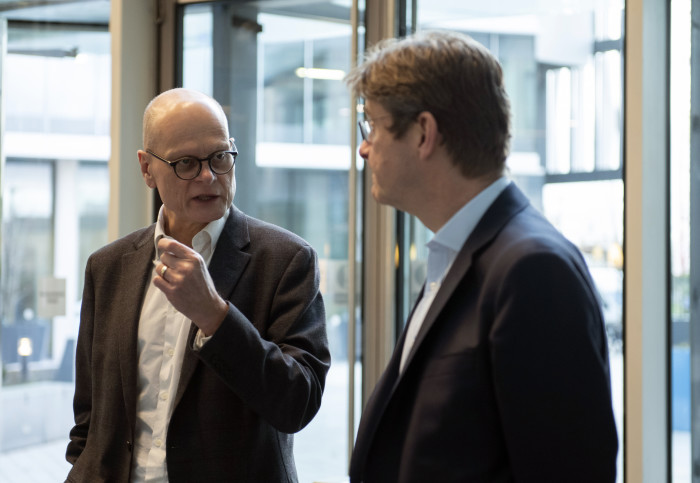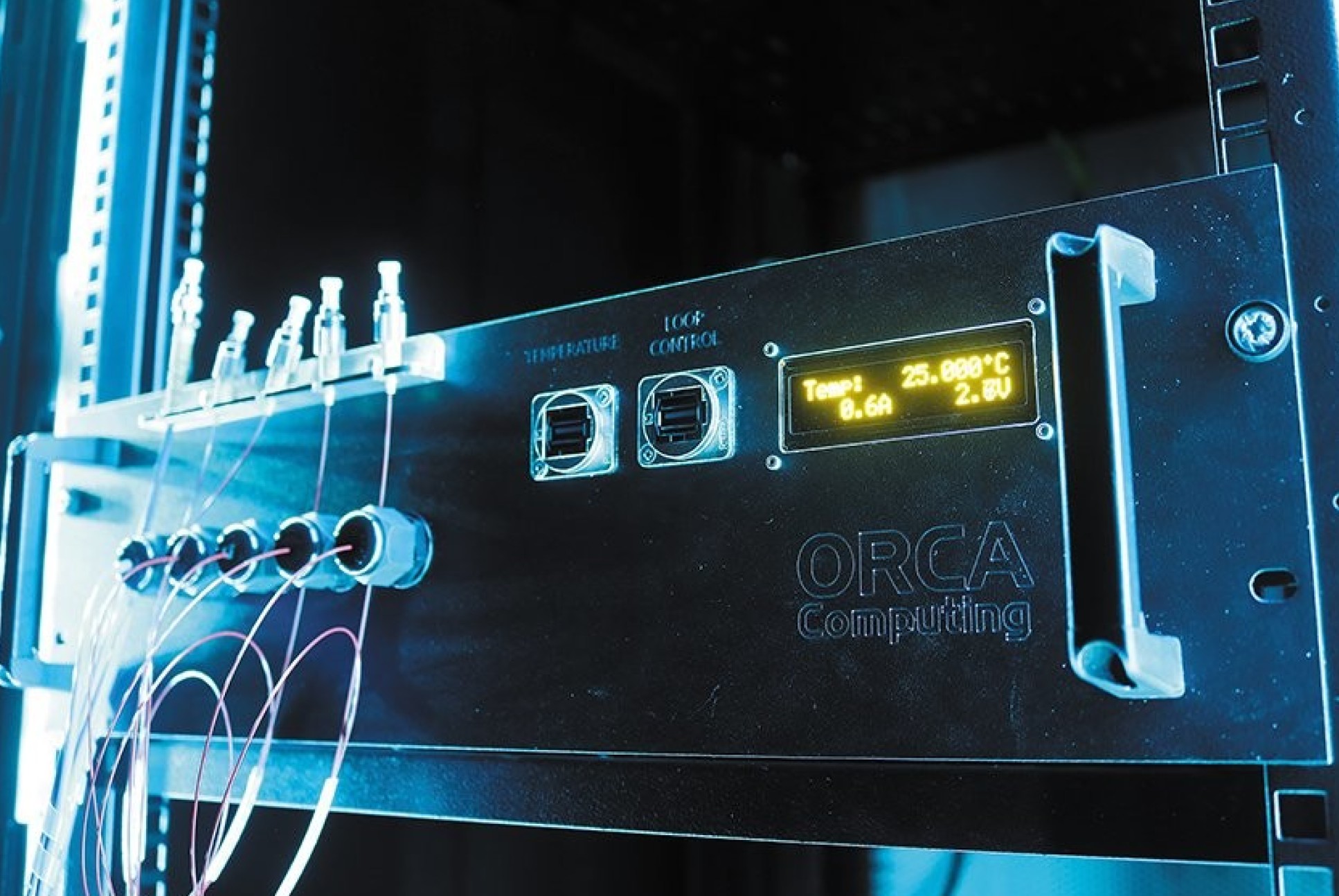White City startup secures $15m to advance quantum computing
by Ian Mundell

Professor Ian Walmsley is co-founder of ORCA Computing
ORCA Computing has won the confidence of investors and the Ministry of Defence with its photonic approach to quantum computing.
ORCA Computing, a startup company based at Imperial’s White City Campus, has raised $15 million in venture funding to continue developing its quantum computing technology and associated software. The company, co-founded by Imperial Provost Professor Ian Walmsley, has also signed an agreement to supply the first ever quantum computers to the Ministry of Defence.
“This investment makes it possible for ORCA to tackle the formidable engineering challenges for scaling up our photonic platform, as well as to build up our world-class team and to deliver early–stage quantum computers for partners to explore how these can improve their missions and businesses,” said Professor Walmsley, who is also chair of ORCA Computing.
The technology behind ORCA is based on EPSRC- and ERC-funded research, carried out when Professor Walmsley was a professor at Oxford University, working with co-founder Dr Josh Nunn. The company was established after he moved to Imperial, and has occupied space at the Translation & Innovation Hub (I-HUB) on Imperial’s White City research and innovation campus.
Computing with light
Quantum computing takes advantage of the quantum properties of light and matter, which describe the world at the most fundamental level, to process information in radically different ways than is possible with conventional computers. While still in the early stages of development, quantum computers have the potential to revolutionise fields such cryptanalysis, drug discovery, materials research and artificial intelligence.
Our mission is to put photonic systems in the hands of users. Dr Richard Murray Chief executive, ORCA Computing
ORCA’s approach is based on photons, the basic elements of light. This means that its quantum computers can be built with relatively simple optical components, and without the cryogenic cooling systems required by most other approaches.
“Light has a huge part to play in the future of quantum computing as an effective, scalable resource,” said Dr Richard Murray, co-founder and chief executive of ORCA Computing. “Our mission is to put photonic systems in the hands of users today so that we deliver value in the short as well as long term.”
The latest round of venture funding brings ORCA $15 million (around £12 million) to further develop its photonic quantum computing systems, along with the software needed for future applications. The funding was led by Octopus Ventures, and included Oxford Science Enterprises, Quantonation and Verve Ventures.

“We’re incredibly happy to be joined on our journey by some of Europe’s most knowledgeable quantum and deep tech investors,” said Dr Murray. “Their support will allow us to accelerate development of ORCA’s short term and long term quantum systems.”
Quantum for defence
On the same day as the funding news, ORCA announced that it had signed a ground-breaking agreement with the Ministry of Defence (MoD) to explore defence applications for quantum technology. Over the course of a year, the MoD will develop programmes for ORCA’s PT-1 model, in collaboration with its partners.
This work with ORCA Computing is a milestone moment for the MoD. Dr Stephen Till MoD Defence Science and Technology Laboratory
“This work with ORCA Computing is a milestone moment for the MoD,” said Dr Stephen Till, of the MoD's Defence Science and Technology Laboratory. “Accessing our own quantum computing hardware will not only accelerate our understanding of quantum computing, but the computer's room-temperature operation will also give us the flexibility to use it in different locations for different requirements.”
In particular, the work will look at how quantum and conventional computers can work together. “We expect the ORCA system to provide significantly improved latency - the speed at which we can read and write to the quantum computer. This is important for hybrid algorithms which require multiple handovers between quantum and classical systems,” Dr Till explained.
The collaboration will also help ORCA develop its systems. ”Our partnership with MoD gives us hands-on close interaction, and working with real hardware will help us to jointly discover new applications of this revolutionary new technology,” said Dr Murray.

ORCA is already deeply involved in civil applications. Last year it was chosen to lead a £9 million project for UK Research & Innovation, looking at how quantum computing can integrate with the data centres that currently underpin and drive the digital economy. This work will involve a 15-strong consortium that includes BP, Airbus, Riverlane, KETS, BT, and five leading UK universities.
Rooted at Imperial
ORCA Computing was established nearly three years ago at Imperial’s White City research and innovation campus, which was created to offer new and growing deep-science companies the opportunity to locate near to one another, and close to the academic expertise and resources of Imperial. The Campus is now part of the broader White City Innovation District, a partnership between the College and the London Borough of Hammersmith and Fulham, home to some of the world’s most innovative organisations, spanning life sciences, deep tech, media and the creative arts.
We can make a major impact on the world. The intellectual property and the resources provided by Imperial and Oxford University are crucial in supporting this. Professor Ian Walmsley Provost, Imperial College and Chair, ORCA Computing
When deciding where to start-up, ORCA was looking for a London base with the infrastructure essential for a young deep tech company. It was also drawn to the I-HUB by the possibilities for close collaboration with Imperial’s quantum scientists.
“With ORCA Computing, we are building a technology platform that could help lead a quantum computing revolution,” Professor Walmsley said in an in-depth profile of the company last year. “As a business, we can make a major impact on the world. But the intellectual property and the resources provided by Imperial and Oxford University are crucial in supporting this. It has proven to be really valuable for the company to be located in a vibrant research and entrepreneurial community.”
The company has built up close links with researchers such as Dr Steve Kolthammer, Professor Myungshik Kim and Dr Michael Vanner, all in the Department of Physics. It has also turned to Imperial for quantum computing expertise when building its team. “When we recruit people from the College, they hit the ground running,” said Dr Murray.
Article text (excluding photos or graphics) © Imperial College London.
Photos and graphics subject to third party copyright used with permission or © Imperial College London.
Reporter
Ian Mundell
Enterprise